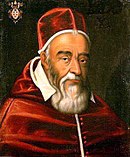Papal conclave, March 1605

Coat of arms during the vacancy of the Holy See
|
|
| Dates and location | |
|---|---|
| 14 March – 1 April 1605 Apostolic Palace, Papal States |
|
| Elected Pope | |
|
Alessandro Ottaviano de' Medici Name taken: Leo XI |
|
 |
|
The papal conclave of March–April 1605 was convened on the death of Pope Clement VIII and ended with the election of Alessandro Ottaviano de' Medici as Pope Leo XI. It was the first of two papal conclaves in 1605; Leo died on 27 April 1605, twenty-six days after he was elected. The conclave was dominated by conflict over whether Cesare Baronius should be elected pope, and Philip III of Spain excluded both Baronius and the eventually successful candidate, Medici.
On 17 September 1595, Clement VIII accepted the decision of Henry IV of France to convert to the Catholic Church, which Henry had previously made to secure the French monarchy, and presided over a ceremony of papal absolution that removed the excommunication order placed on him by Sixtus V. The Spanish faction had previously opposed the pope taking these actions, but the French negotiators had talked about the possibility of a schism; this, along with Henry's victories in the French Wars of Religion, overcame Spanish opposition.
Clement also formed a commission that annulled Henry's marriage to Marguerite of Valois following the death of his mistress Gabrielle d'Estrées. Afterwards, Clement helped arrange Henry's marriage to Marie de' Medici that ensured a Catholic succession.
Clement worked to decrease the influence of Spanish cardinals in the College of Cardinals; he created five French cardinals and the Italian cardinals he created were considered neutral. Clement wanted the French cardinals he created to be present in Rome and to take part in the governance of the Church. Henry IV likewise demanded that three French cardinals go to Rome, and they were present at Clement's death on 3 March 1605.
In addition to the secular politics that impacted them, papal elections during this period were marked by a strategy by elite families who wanted to acquire prestige and power. These strategies often played out over several generations through patronage and the accumulation of wealth, and the bestowing of favours on family members once an individual was elected to the papacy was expected.
...
Wikipedia
